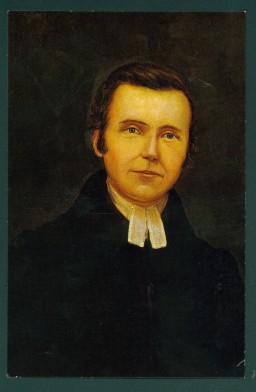Thomas Hardy, “The Distracted Preacher”
By Christopher Benson, Professor of Literature

Melville House has an attractive series called “The Art of the Novella.” Since leisure reading is limited during the academic year, I opted for Thomas Hardy’s novella, The Distracted Preacher. Besides my fondness for the author, the title alone got my attention. Naturally, I wanted to know why the preacher is distracted. I should have guessed the answer because it is a temptation common to man. Here is the publisher’s description:
From the master of Victorian tragedy, the surprisingly comic adventures of a man caught between romance and religion. When young Mr. Stockdale arrives in a small village to fill in for the Methodist minister, he finds himself pining for his comely new landlady. But she leads a mysterious life, keeping odd hours and speaking in hushed tones. As his love for her grows, he’s soon at the center of a hilarious high-stakes adventure, complete with slapstick, hijinks, and a marauding band of cross-dressers. And he’s forced to choose: follow his heart or his higher purpose?
The Distracted Preacher turns a propositional truth of Jesus — “Render to Caesar the things that are Caesar’s, and to God the things that are God’s” (Mt. 22:15-22) — into an entertaining and educational story. Mr. Stockdale’s landlady, Lizzy Newberry, participates in her town’s smuggling operation of liquor. By hiding and selling the contraband, she fails to render to the King the things that are the King’s, as her love-struck tenant entreats after a nocturnal adventure:
“Lizzy, all this is very wrong,” he said. “Don’t you remember the lesson of the tribute-money? — ‘Render unto Caesar the things that are Caesar’s.’ Surely you have heard that read times enough in your growing up?”
“He’s dead,” she pouted.
“But the spirit of the text is in force just the same.”
“My father did it, and so did my grandfather, and almost everybody in Nether-Moynton lives by it; and life would be so dull if it wasn’t for that, that I should not care to live at all.”
“I am nothing to live for, of course,” he replied, bitterly. “You would not think it worth while to give up this wild business and live for me alone?”
This passage fascinates me because it reveals a double gesture characteristic in Hardy’s writing: he invokes Christian morality only to (partially) subvert it, not only in Mrs. Newberry’s atheist pronouncement about the Son of God’s death, whose words were quoted to her as if they had authority, but also in the minister’s weak-kneed qualification that a divine aura still lingers in the Bible. Even worse, Mr. Stockdale invites his beloved into idolatry, begging Lizzy to give up “this wild business and live for [him] alone,” with emphasis on the word “alone.” As a minister, his vocation obliges him to implore the sinner to repent for the sake of God alone.
Clearly, the preacher is more than distracted. That adjective is a euphemism, concealing his spiritual crisis. He is at risk of damnation if romantic aspiration leads him to become Lizzy’s partner in crime. Notice, in his appeal to scriptural authority, he left off the second half of Jesus’ teaching about rendering to God the things that are God’s; it is the most important half because everything — from liquor to love — belongs to God. Was this omission a lapse of memory or a deliberate alteration of the text?
If Mrs. Newsberry must render liquor to the king’s men, who sniff every corner of her village for the contraband, then Mr. Stockdale must render his smitten heart to God, a sacrifice that is far more costly. To his credit, he makes the needful sacrifice, pursuing his religion over romance. Ultimately, however, his loss of love is found again because of providential generosity, which comports with another teaching of Jesus: “For whoever would save his life will lose it, but whoever loses his life for my sake will find it” (Matthew 16:25). For an agnostic author typically given to pessimistic fatalism, this conclusion ironically imitates the generosity of his Maker.